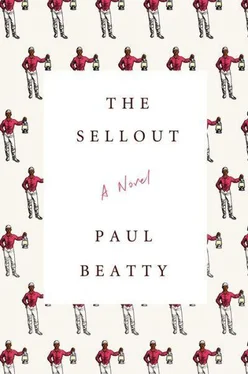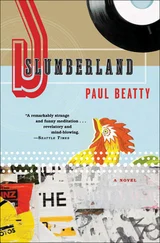After all the evidence photos had been taken, the witnesses interviewed, and macabre homicide jokes cracked, without dropping my shake, I lifted my father’s bullet-riddled body up by the underarms and dragged his heels through the chalk outline, through the yellow numbered shell-casing markers, through the intersection, the parking lot, and the glass double doors. I sat my father down at his favorite table, ordered his “usual,” two chocolate frosteds and a large milk, and placed it in front of him. Since he had arrived thirty-five minutes late and dead, the meeting was already in progress, chaired by Foy Cheshire, fading TV personality, erstwhile friend of my father, and a man all too anxious to fill the void in leadership. There was a brief moment of awkwardness. The skeptical Dum Dums looking at the heavyset Foy like the nation must have looked to Andrew Johnson after Lincoln had been assassinated.
I loudly slurped up the dregs of my shake. The signal to carry on, because that’s the way my father would’ve wanted it.
The Dum Dum Donut revolution must go on.
My father founded the Dum Dum Donut Intellectuals way back when, when he noticed that the local Dum Dum Donuts franchise was the only non-Latino or black-owned business that wasn’t burned and pillaged in the riots. In fact, looters, police officers, and firemen alike used the twenty-four-hour drive-thru window to fuel up on crullers, cinnamon twists, and the surprisingly good lemonade as they fought off the conflagration, the fatigue, and the pesky news crews who asked anyone within arm’s length of a microphone, “Do you think the riots will change anything?”
“Well, I’m on TV, ain’t I, bitch?”
In all its years of existence, Dum Dum Donuts has never been robbed, burglarized, egged, or vandalized. And to this day, the franchise’s art deco facade remains graffiti and piss-stain free. Customers don’t park in the handicapped spot. Bicyclists leave their vehicles unlocked and unattended, stuffed neatly into the rack like Dutch cruisers parked at an Amsterdam train station. There’s something tranquil, almost monastic, about the inner-city donut shop. It’s clean. Spotless. The employees are always sane and respectful. Maybe it’s the muted lighting or the bright decor, whose color scheme is designed to be emblematic of a maple frosted with rainbow sprinkles. Whatever it is, my father recognized the donut shop was the one place in Dickens where niggers knew how to act. People passed the non-dairy creamer. Strangers politely pointed to the tip of your nose and made the universal sign for “Brush the powdered sugar off your face.” In 7.81 square miles of vaunted black community, the 850 square feet of Dum Dum Donuts was the only place in the “community” where one could experience the Latin root of the word, where a citizen could revel in common togetherness. So one rainy Sunday afternoon, not long after the tanks and media attention had left, my father ordered his usual. He sat at the table nearest the ATM and said aloud, to no one in particular, “Do you know that the average household net worth for whites is $113,149 per year, Hispanics $6,325, and black folks $5,677?”
“For real?”
“What’s your source material, nigger?”
“The Pew Research Center.”
Motherfuckers from Harvard to Harlem respect the Pew Research Center, and hearing this, the concerned patrons turned around in their squeaky plastic seats as best they could, given that donut shop swivel chairs swivel only six degrees in either direction. Pops politely asked the manager to dim the lights. I switched on the overhead projector, slid a transparency over the glass, and together we craned our necks toward the ceiling, where a bar graph titled “Income Disparity as Determined by Race” hovered overhead like some dark, damning, statistical cumulonimbus cloud threatening to rain on our collective parades.
“I was wondering what that li’l nigger was doing in a donut shop with a damn overhead projector.”
Next thing the people knew, my father, interspersed with a macroeconomics circulation flowchart there, a sketch of Milton Friedman here, was facilitating an impromptu seminar about the evils of deregulation and institutional racism. How it wasn’t the Keynesian lapdogs so beloved by the banks and the media who predicted the most recent financial meltdown but the behavioral economists who knew that the market isn’t swayed by interest rates and fluctuations in GDP, rather by greed, fear, and fiscal illusion. The discussion grew animated. Their mouths stuffed with pastries, their lips flaked with coconut shavings, the Dum Dum Donuts patrons decried low-interest checking and the nerve of the goddamn cable company to charge late fees for not promptly paying ahead of time in July for services not rendered until August. One woman, her jowls filled to near bursting with macaroons, asked my father, “How much the Chinos make?”
“Well, Asian men earn more than any other demographic.”
“Even the faggots?” shouted the assistant manager. “You sure Asians make more than the faggots? ’Cause I hear faggots be making cash hand over fist.”
“Yes, even the homosexuals, but remember, Asian men have no power.”
“And what about the gay Asian males? Have you done a regression analysis controlling for race and sexual orientation?” That insightful comment came from Foy Cheshire, about ten years older than my dad, standing next to the water fountain, hands in his pockets, and wearing a wool sweater, even though it was 75 degrees outside. This was way before the money and fame. Back then he was an assistant professor in urban studies, at UC Brentwood, living in Larchmont with the rest of the L.A. intellectual class, and hanging out in Dickens doing field research for his first book, Blacktopolis: The Intransigence of African-American Urban Poverty and Baggy Clothes. “I think an examination of the confluence of independent variables on income could result in some interesting r coefficients. Frankly, I wouldn’t be surprised by p values in the.75 range.”
Despite the smug attitude, Pops took a liking to Foy right away. Though Foy was born and raised in Michigan, it wasn’t often Dad found somebody in Dickens who knew the difference between a t-test and an analysis of variance. After debriefing over a box of donut holes, everyone — locals and Foy included — agreed to meet on a regular basis, and the Dum Dum Donut Intellectuals were born. But where my father saw an opportunity for information exchange, public advocacy, and communal counsel, Foy saw a midlife springboard to fame. Things between the two of them started amicably enough. They strategized and chased women together. But after a few years, Foy Cheshire got famous and my father never did. Foy was no deep thinker, but back then he was infinitely better organized than my dad, whose main strength was also his biggest weakness — he was way ahead of his time. While my dad was writing incomprehensible and unpublishable theories linking black oppression, game and social learning theory, Foy hosted a television talk show. Interviewing B-list celebrities and political figures, writing magazine articles, and taking meetings in Hollywood.
Once, while watching my father typing away at his desk, I asked him where his ideas came from. He turned around, his tongue thick with Scotch whiskey, and said, “The real question is not where do ideas come from but where do they go.”
“So where do they go?”
“Punk motherfuckers like Foy Cheshire steal them and make not-so-small fortunes off your shit and invite you to the launch party like nothing happened.”
The idea that Foy stole from my father was an award-winning Saturday-morning cartoon called The Black Cats ’n’ Jammin’ Kids , a show that had been syndicated around the world, dubbed into seven languages, and in the late mid-90s made Foy enough money to buy a dream house in the hills. My father never said anything in public. Never confronted Foy at the meetings, because, as he put it, “our people are in dire need of everything except acrimony.” And in later years, when L.A. had turned Foy out like the small-town runaway he was at heart, after he’d lost his bankroll to a drug habit and a series of freckle-faced Creole L.A. women, been cheated out of his residuals by the production company, and had everything but his house and car seized by the IRS for tax evasion, my father kept quiet. When, gun to temple, Foy, flat broke and embarrassed, called to ask my dad to nigger-whisper him out of his suicidal funk, my father maintained patient-doctor confidentiality. Kept silent about the night sweats, the voices, the narcissistic personality disorder diagnosis, and the three-week psychiatric hospitalization. And the night my devoutly atheist father died, Foy prayed and spoke over him, hugged his lifeless body to his chest, and then acted as if the blood on his sparkling white Hugo Boss shirt was his own. You could see in his face that, despite his speech and poignant words about my father’s death symbolizing black injustice, deep down he was happy my dad was gone. Because, with my dad’s death, his secrets were safe, and maybe his grandiose Robespierre pipe dreams about the Dum Dum Donut Intellectuals being the black equivalent to the Jacobins might come true.
Читать дальше












